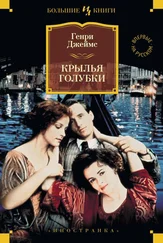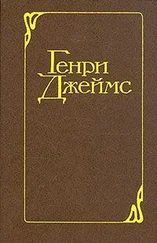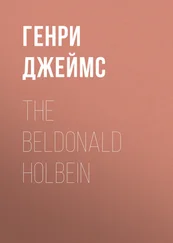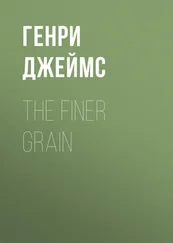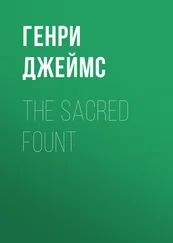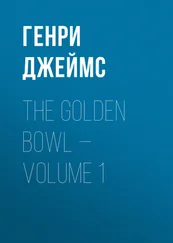Генри Джеймс - Embarrassments
Здесь есть возможность читать онлайн «Генри Джеймс - Embarrassments» — ознакомительный отрывок электронной книги совершенно бесплатно, а после прочтения отрывка купить полную версию. В некоторых случаях можно слушать аудио, скачать через торрент в формате fb2 и присутствует краткое содержание. Жанр: foreign_antique, foreign_prose, foreign_sf, на английском языке. Описание произведения, (предисловие) а так же отзывы посетителей доступны на портале библиотеки ЛибКат.
- Название:Embarrassments
- Автор:
- Жанр:
- Год:неизвестен
- ISBN:нет данных
- Рейтинг книги:4 / 5. Голосов: 1
-
Избранное:Добавить в избранное
- Отзывы:
-
Ваша оценка:
- 80
- 1
- 2
- 3
- 4
- 5
Embarrassments: краткое содержание, описание и аннотация
Предлагаем к чтению аннотацию, описание, краткое содержание или предисловие (зависит от того, что написал сам автор книги «Embarrassments»). Если вы не нашли необходимую информацию о книге — напишите в комментариях, мы постараемся отыскать её.
Embarrassments — читать онлайн ознакомительный отрывок
Ниже представлен текст книги, разбитый по страницам. Система сохранения места последней прочитанной страницы, позволяет с удобством читать онлайн бесплатно книгу «Embarrassments», без необходимости каждый раз заново искать на чём Вы остановились. Поставьте закладку, и сможете в любой момент перейти на страницу, на которой закончили чтение.
Интервал:
Закладка:
“Now, at last, what is it?”
She had been expecting me; she was ready. She gave a long, slow, soundless headshake, merciful only in being inarticulate. This mercy didn’t prevent its hurling at me the largest, finest, coldest “Never!” I had yet, in the course of a life that had known denials, had to take full in the face. I took it and was aware that with the hard blow the tears had come into my eyes. So for a while we sat and looked at each other; after which I slowly rose. I was wondering if some day she would accept me; but this was not what I brought out. I said as I smoothed down my hat: “I know what to think then; it’s nothing!”
A remote, disdainful pity for me shone out of her dim smile; then she exclaimed in a voice that I hear at this moment: “It’s my life! ” As I stood at the door she added: “You’ve insulted him!”
“Do you mean Vereker?”
“I mean—the Dead!”
I recognised when I reached the street the justice of her charge. Yes, it was her life—I recognised that too; but her life none the less made room with the lapse of time for another interest. A year and a half after Corvick’s death she published in a single volume her second novel, “Overmastered,” which I pounced on in the hope of finding in it some tell-tale echo or some peeping face. All I found was a much better book than her younger performance, showing I thought the better company she had kept. As a tissue tolerably intricate it was a carpet with a figure of its own; but the figure was not the figure I was looking for. On sending a review of it to The Middle I was surprised to learn from the office that a notice was already in type. When the paper came out I had no hesitation in attributing this article, which I thought rather vulgarly overdone, to Drayton Deane, who in the old days had been something of a friend of Corvick’s, yet had only within a few weeks made the acquaintance of his widow. I had had an early copy of the book, but Deane had evidently had an earlier. He lacked all the same the light hand with which Corvick had gilded the gingerbread—he laid on the tinsel in splotches.
X
Six months later appeared “The Right of Way,” the last chance, though we didn’t know it, that we were to have to redeem ourselves. Written wholly during Vereker’s absence, the book had been heralded, in a hundred paragraphs, by the usual ineptitudes. I carried it, as early a copy as any, I this time flattered myself, straightway to Mrs. Corvick. This was the only use I had for it; I left the inevitable tribute of The Middle to some more ingenious mind and some less irritated temper. “But I already have it,” Gwendolen said. “Drayton Deane was so good as to bring it to me yesterday, and I’ve just finished it.”
“Yesterday? How did he get it so soon?”
“He gets everything soon. He’s to review it in The Middle .”
“He—Drayton Deane—review Vereker?” I couldn’t believe my ears.
“Why not? One fine ignorance is as good as another.”
I winced, but I presently said: “You ought to review him yourself!”
“I don’t ‘review,’” she laughed. “I’m reviewed!”
Just then the door was thrown open. “Ah yes, here’s your reviewer!” Drayton Deane was there with his long legs and his tall forehead: he had come to see what she thought of “The Right of Way,” and to bring news which was singularly relevant. The evening papers were just out with a telegram on the author of that work, who, in Rome, had been ill for some days with an attack of malarial fever. It had at first not been thought grave, but had taken in consequence of complications a turn that might give rise to anxiety. Anxiety had indeed at the latest hour begun to be felt.
I was struck in the presence of these tidings with the fundamental detachment that Mrs. Cor-vick’s public regret quite failed to conceal: it gave me the measure of her consummate independence. That independence rested on her knowledge, the knowledge which nothing now could destroy and which nothing could make different. The figure in the carpet might take on another twist or two, but the sentence had virtually been written. The writer might go down to his grave: she was the person in the world to whom—as if she had been his favoured heir—his continued existence was least of a need. This reminded me how I had observed at a particular moment—after Corvick’s death—the drop of her desire to see him face to face. She had got what she wanted without that. I had been sure that if she hadn’t got it she wouldn’t have been restrained from the endeavour to sound him personally by those superior reflections, more conceivable on a man’s part than on a woman’s, which in my case had served as a deterrent. It wasn’t however, I hasten to add, that my case, in spite of this invidious comparison, wasn’t ambiguous enough. At the thought that Vereker was perhaps at that moment dying there rolled over me a wave of anguish—a poignant sense of how inconsistently I still depended on him. A delicacy that it was my one compensation to suffer to rule me had left the Alps and the Apennines between us, but the vision of the waning opportunity made me feel as if I might in my despair at last have gone to him. Of course I would really have done nothing of the sort. I remained five minutes, while my companions talked of the new book, and when Drayton Deane appealed to me for my opinion of it I replied, getting up, that I detested Hugh Vereker—simply couldn’t read him. I went away with the moral certainty that as the door closed behind me Deane would remark that I was awfully superficial. His hostess wouldn’t contradict him.
I continue to trace with a briefer touch our intensely odd concatenation. Three weeks after this came Vereker’s death, and before the year was out the death of his wife. That poor lady I had never seen, but I had had a futile theory that, should she survive him long enough to be decorously accessible, I might approach her with the feeble flicker of my petition. Did she know and if she knew would she speak? It was much to be presumed that for more reasons than one she would have nothing to say; but when she passed out of all reach I felt that renouncement was indeed my appointed lot. I was shut up in my obsession for ever—my gaolers had gone off with the key. I find myself quite as vague as a captive in a dungeon about the time that further elapsed before Mrs. Corvick became the wife of Drayton Deane. I had foreseen, through my bars, this end of the business, though there was no indecent haste and our friendship had rather fallen off. They were both so “awfully intellectual” that it struck people as a suitable match, but I knew better than any one the wealth of understanding the bride would contribute to the partnership. Never, for a marriage in literary circles—so the newspapers described the alliance—had a bride been so handsomely dowered. I began with due promptness to look for the fruit of their union—that fruit, I mean, of which the premonitory symptoms would be peculiarly visible in the husband. Taking for granted the splendour of the lady’s nuptial gift, I expected to see him make a show commensurate with his increase of means. I knew what his means had been—his article on “The Right of Way” had distinctly given one the figure. As he was now exactly in the position in which still more exactly I was not I watched from month to month, in the likely periodicals, for the heavy message poor Corvick had been unable to deliver and the responsibility of which would have fallen on his successor. The widow and wife would have broken by the rekindled hearth the silence that only a widow and wife might break, and Deane would be as aflame with the knowledge as Cor-vick in his own hour, as Gwendolen in hers had been. Well, he was aflame doubtless, but the fire was apparently not to become a public blaze. I scanned the periodicals in vain: Drayton Deane filled them with exuberant pages, but he withheld the page I most feverishly sought. He wrote on a thousand subjects, but never on the subject of Vereker. His special line was to tell truths that other people either “funked,” as he said, or overlooked, but he never told the only truth that seemed to me in these days to signify. I met the couple in those literary circles referred to in the papers: I have sufficiently intimated that it was only in such circles we were all constructed to revolve. Gwendolen was more than ever committed to them by the publication of her third novel, and I myself definitely classed by holding the opinion that this work was inferior to its immediate predecessor. Was it worse because she had been keeping worse company? If her secret was, as she had told me, her life—a fact discernible in her increasing bloom, an air of conscious privilege that, cleverly corrected by pretty charities, gave distinction to her appearance—it had yet not a direct influence on her work. That only made—everything only made—one yearn the more for it, rounded it off with a mystery finer and subtler.
Читать дальшеИнтервал:
Закладка:
Похожие книги на «Embarrassments»
Представляем Вашему вниманию похожие книги на «Embarrassments» списком для выбора. Мы отобрали схожую по названию и смыслу литературу в надежде предоставить читателям больше вариантов отыскать новые, интересные, ещё непрочитанные произведения.
Обсуждение, отзывы о книге «Embarrassments» и просто собственные мнения читателей. Оставьте ваши комментарии, напишите, что Вы думаете о произведении, его смысле или главных героях. Укажите что конкретно понравилось, а что нет, и почему Вы так считаете.

